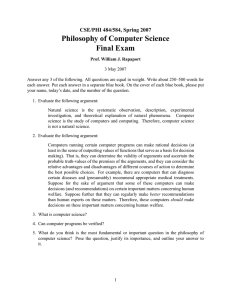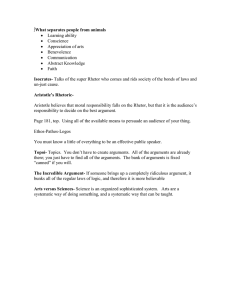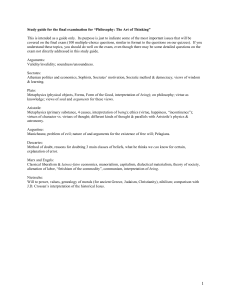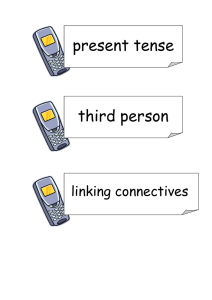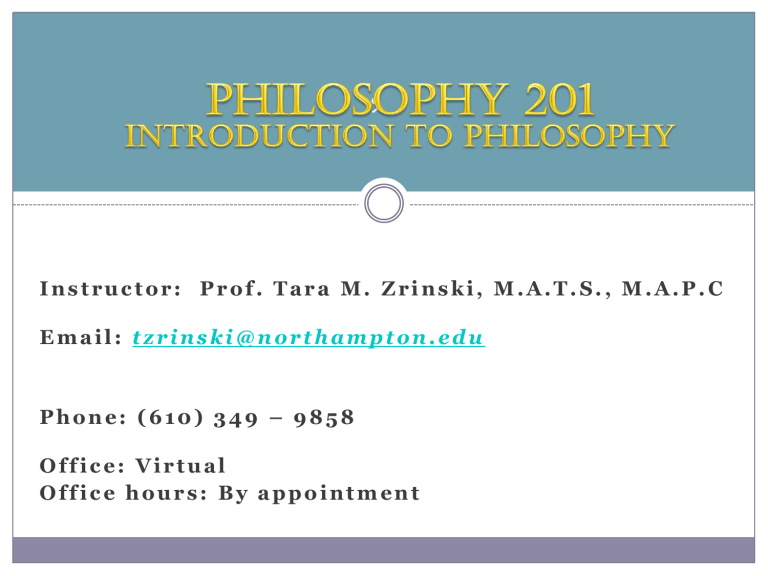
, Instructor: Prof. Tara M. Zrinski, M.A.T.S., M.A.P.C Email: tzrinski@northampton.edu Phone: (610) 349 – 9858 Office: Virtual Office hours: By appointment Solomon, Robert. Big Questions: A Short Introduction to Philosophy (10th edition). Cengage: Massachusetts, 2017. ISBN: 978-1-305-95544-8 Online courses are designed to give you some flexibility in your ability to access course content, submit assignments, and interact with your instructor as well as your fellow students. However, these courses are not self-paced. You are expected to fully participate in all class activities and to submit all assignments by their due dates. Note that if you do not participate in the class, submit assignments or contact the professor during a consecutive two-week period, you may be asked to withdraw yourself from the class on the recommendation of the professor. However, do not assume that the professor will automatically withdraw you. Unless you officially withdraw, you may still owe money for the course or receive a grade of “F” as your final grade on your transcript. 1. Students are responsible for their work and for making sure that their work represents their own honest efforts to meet the goals of the course. 2. Students are responsible for learning and following the policies and expectations of the college and for understanding the consequences of action that violate the policy on academic honesty. 3. Students are responsible for showing that the work they present is theirs in whatever ways are deemed appropriate by the instructor. Under penalty of failure: Plagiarism The attempt to gain academic credit for work that does not represent the student’s own efforts, ideas or knowledge. Students may consult with the Learning Center at CC 315 or their Student Handbook for more information prior to submitting the assignment for credit if there are any questions about proper citation of sources within a written assignment Discussion Board (1 – 5) 250 points A = 930 – 1075 A = 900 – 930 Short Essays (1 & 2) 200 points B+ = 870 – 900 Logic Assignment 1 75 points B = 830 – 870 B- = 800 – 830 Logic Assignment 2 75 points C+ = 770 - 800 Quiz 1 – 4 Final Exam Extra Credit Collaborate Live (3) TOTAL POINTS 200 C = 730 – 770 C- = 700 – 730 points 200 points 75 points D+ = 670 – 700 1075 points D = 630 – 670 D- = 600 – 630 F = 000 – 599 PHILOSOPHY is a verb • Actively Stating What We Believe • Developing Ideas • Making Connections & Comparisons • Resolving Difficulties • Coordinating Many Ideas into a Single World View • Defending or Refuting Your Arguments Primary Features of DOING PHILOSOPHY •A r t i c u l a t i o n : p u t t i n g y o u r i d e a s i n c l e a r , c o n c i s e a n d readily understandable language •A r g u m e n t - s u p p o r t i n g y o u r i d e a s w i t h r e a s o n s f r o m other ideas, principles and observations to establish your conclusions and overcome objections •A n a l y s i s - u n d e r s t a n d i n g a n i d e a s b y d i s t i n g u i s h i n g and clarifying its various components •S y n t h e s i s - g a t h e r i n g t o g e t h e r d i f f e r e n t i d e a s i n t o a single unified vision CONCEPTS & FRAMEWORKS Concept- the basic unit of Philosophical projects which define the form of our experiences, or empirical knowledge A priori knowledge- is knowledge Independent of any particular Experience; i.e. number Priori knowledge– knowledge that is dependent on experiences 4 legs Breeds o f dog Framework- web of abstract concepts that form the basis and organization of our perspective Lifestyle Ideology Climate of opinion World view Dog barks Not dog BUZZWORDS FREEDOM TRUTH REALITY MORALITY LOVE GOD SCIENCE ART DEFINE YOUR TERMS! Doing Philosophy with STYLE What you will need should you choose to complete this adventure. . . . 1. 2. 3. 4. 5. 6. Your Ideas Critical Thinking Argumentation A Problem Imagination Style “The examined life is not worth living” ~ Socrates A little logic EXAMPLE: syllogism ARGUMENTS BY DEDUCTION DEDUCTION – one argues for the truth of a conclusion by deducting a statement from a number of others Axioms- true statements whose proof is obvious Inference- process of reasoning from one set of principles to another (Premise 1) All philosophers are wise (Premise 2) Socrates is a philosopher (Conclusion) Therefore, Socrates is wise Valid Argument- follows the rules of inference (Premise 1) All cows are purple (Premise 2) Socrates is a cow (Conclusion) Therefore, Socrates is purple Sound Argument- when and argument is both valid and all of its premises are true statements ARGUMENTS BY INDUCTION INDUCTION- the process of inferring general conclusions from a sufficiently large sample of particular observations. Formal Fallacyviolates the rules of inference Informal Fallacyincludes ambiguous terminology, biased language, evasion of the facts and distractions. Example (Hypothesis) God exists. (Premise) The Bible says God exists. (Conclusion) Therefore, God exists. An inductive argument that is well supported by its evidence or assertions is STRONG. An inductive argument that contains false, distorted or otherwise unsupportable evidence is WEAK. CRITIZING ARGUMENTS Examine each statement For deductive arguments– Are all the premises true? For inductive arguments – Is the evidence false or distorted? Use counterexamples to refute a statement Point out contradictions or inconsistencies Create a paradox (reductio ad absurdum) “This sentence is false?” (If that is true then it is false) “God is all-powerful, so he could create a mountain so huge that even he could not move it.” Check if statements are incoherent, having nothing to do with each other. Begging the question or repeating the problem as the solution in an attempt to resolve the problem. Ad hominem or ad feminam- accusation against the person Tautology a trivially true statement that repeats the same statement in different ways; circular argument
